

Werkgevers erkennen verantwoordelijkheid bij burn-out. Twee op de drie Belgische werknemers ervaren overmatige stress op het werk.
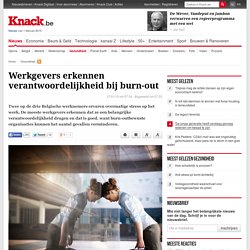
Een op de vier heeft daardoor meerdere klachten zoals hoofdpijn, slaapstoornissen en concentratieverlies. Ruim 95 procent van de werkgevers erkent dat ze een belangrijke verantwoordelijkheid draagt in de problematiek. Volgens hen ligt minstens de helft van de oorzaken van burn-out in de eigen organisatie. Miljoen Nederlanders hebben burn-outklachten. Stress is een groot probleem in Nederland.

How to Lose a Great Employee in 10 Ways. Depression's Evolutionary Roots. Depression seems to pose an evolutionary paradox.
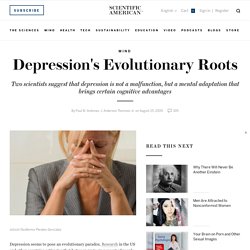
Research in the US and other countries estimates that between 30 to 50 percent of people have met current psychiatric diagnostic criteria for major depressive disorder sometime in their lives. But the brain plays crucial roles in promoting survival and reproduction, so the pressures of evolution should have left our brains resistant to such high rates of malfunction. Mental disorders should generally be rare — why isn’t depression? This paradox could be resolved if depression were a problem of growing old. The functioning of all body systems and organs, including the brain, tends to deteriorate with age. Or, perhaps, depression might be like obesity — a problem that arises because modern conditions are so different from those in which we evolved. Extralegale voordelen voor langdurig zieke? - Business Tips. Question for Your CEO: Are We Catholics or Buddhists? Two business professors at Stanford have come up with an interesting, albeit unusual, way of categorizing companies: Are they Catholics, or Buddhists?
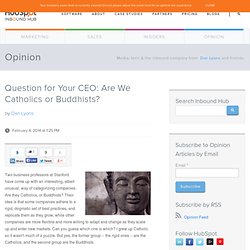
Their idea is that some companies adhere to a rigid, dogmatic set of best practices, and replicate them as they grow, while other companies are more flexible and more willing to adapt and change as they scale up and enter new markets. Can you guess which one is which? I grew up Catholic so it wasn't much of a puzzle. But yes, the former group -- the rigid ones -- are the Catholics, and the second group are the Buddhists. "Le burn-out est une maladie de civilisation" Pascal Chabot : Le burn-out met en évidence un nouveau rapport au travail.
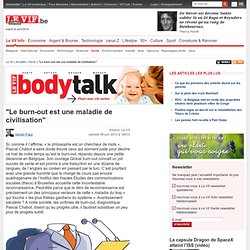
Travailler a toujours eu un côté épuisant. Mais on est dans une tout autre civilisation que celle de Charlie Chaplin dans Les Temps modernes, qui a symbolisé l’adaptation de l’homme à la mécanique au XXe siècle. Aujourd’hui, l’adaptation doit se faire par rapport à une accélération du temps, à des injonctions et à d’autres types d’organisation du travail. The Ivy League, Mental Illness, and the Meaning of Life. The former Yale English professor William Deresiewicz stirred up quite a storm earlier this month with his New Republic essay “Don’t Send Your Kid to the Ivy League”—a damning critique of the nation’s most revered and wealthy educational institutions, and the flawed meritocracy they represent.
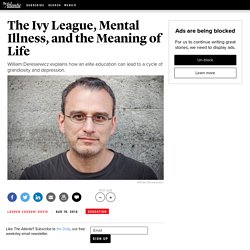
He takes these arguments even further in his upcoming book, Excellent Sheep: The Miseducation of the American Elite and the Way to a Meaningful Life. Part cultural commentary, part philosophical treatise on the meaning of education itself, the book reads like a self-help manual for ambitious yet internally adrift adolescents struggling to figure out how to navigate the college system, and ultimately their own lives. Deresiewicz, who is also the author of A Jane Austen Education: How Six Novels Taught Me About Love, Friendship and the Things That Really Matter, spoke to me on the phone from his home in Portland, Oregon.
Deresiewicz: The mental-health issues, absolutely. The changing nature of work. Frances Coppola explores how increasing automation is fundamentally shifting the nature of work away from 'making stuff' towards personal services.
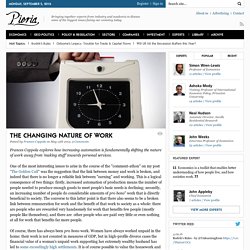
One of the most interesting issues to arise in the course of the "comment-athon" on my post "The Golden Calf" was the suggestion that the link between money and work is broken, and indeed that there is no longer a reliable link between "earning" and working. This is a logical consequence of two things: firstly, increased automation of production means the number of people needed to produce enough goods to meet people's basic needs is declining; secondly, an increasing number of people do considerable amounts of pro bono" work that is directly beneficial to society.
Of course, there has always been pro bono work. Middle-class women have also traditionally worked unpaid outside the home, as well, as have retired gentlemen. 10 Signs You Might Be A Slave. Activist Post The definition of slavery is not nearly as clear as it used to be when we could see the physical chains and whips that shackled human laborers.
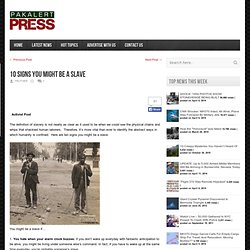
Therefore, it’s more vital than ever to identify the abstract ways in which humanity is confined. Here are ten signs you might be a slave: You might be a slave if… 1. 2. 3. 4. 5. 6. 7. 8. Quelques livres. Critiques du travail. 12 novembre 2008 - Emile Pouget Le Sabotage (HTML) (PDF,1005.4 ko) (PDF,1018.3 ko)
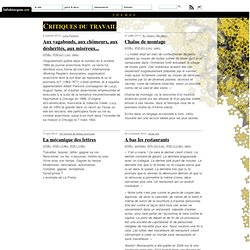
L'obsolescence du sens. Les deux sources de l’absurdité 1. Notre système économique est incompatible avec qui nous sommes. Hier soir dans le cadre du colloque sur l’évolution de la Conscience, j’assistais à ma deuxième rencontre avec Erwin Laszlo, fondateur du Club de Budapest qui était en dialogue avec Andrew Cohen.
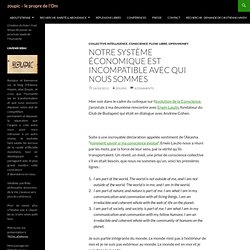
Suite à une incroyable déclaration appelée sentiment de l’Akasha “comment savoir si ma conscience évolue“, Erwin Laszlo nous a réuni par les mots, par la force de leur sens, par la vérité qu’ils transportaient. Un réveil, un éveil, une prise de conscience collective s’il en était besoin, que nous ne sommes qu’un, voici les premières lignes : I am part of the world. Anti Work. Www.ihk-eupen.be/de/02_info/infos1303/007_incapacite.pdf. Malaise au travail: prenez-vous en compte le "contrat psychologique"? Qu'est-ce qu'un "contrat psychologique" en entreprise? Il s'agit d'un contrat implicite qui rend compte d'un certain nombre d'attentes et d'obligations, parfois inconscientes, entre un salarié et son employeur.
Par exemple, l'employeur peut s'attendre à ce que le salarié partage les valeurs de l'entreprise, sans que cela figure sur le contrat de travail. Le salarié peut quant à lui attendre des propositions d'évolution. Ce contrat tacite est porteur de sens et agit directement sur les attitudes et les comportements de chacun. Moeder, waarom werken wij ons uit de naad? Ik werk deeltijds. Een zeer bewuste keuze (die ik me gelukkig kán veroorloven): minder loon, meer tijd om te doen wat ik graag doe.